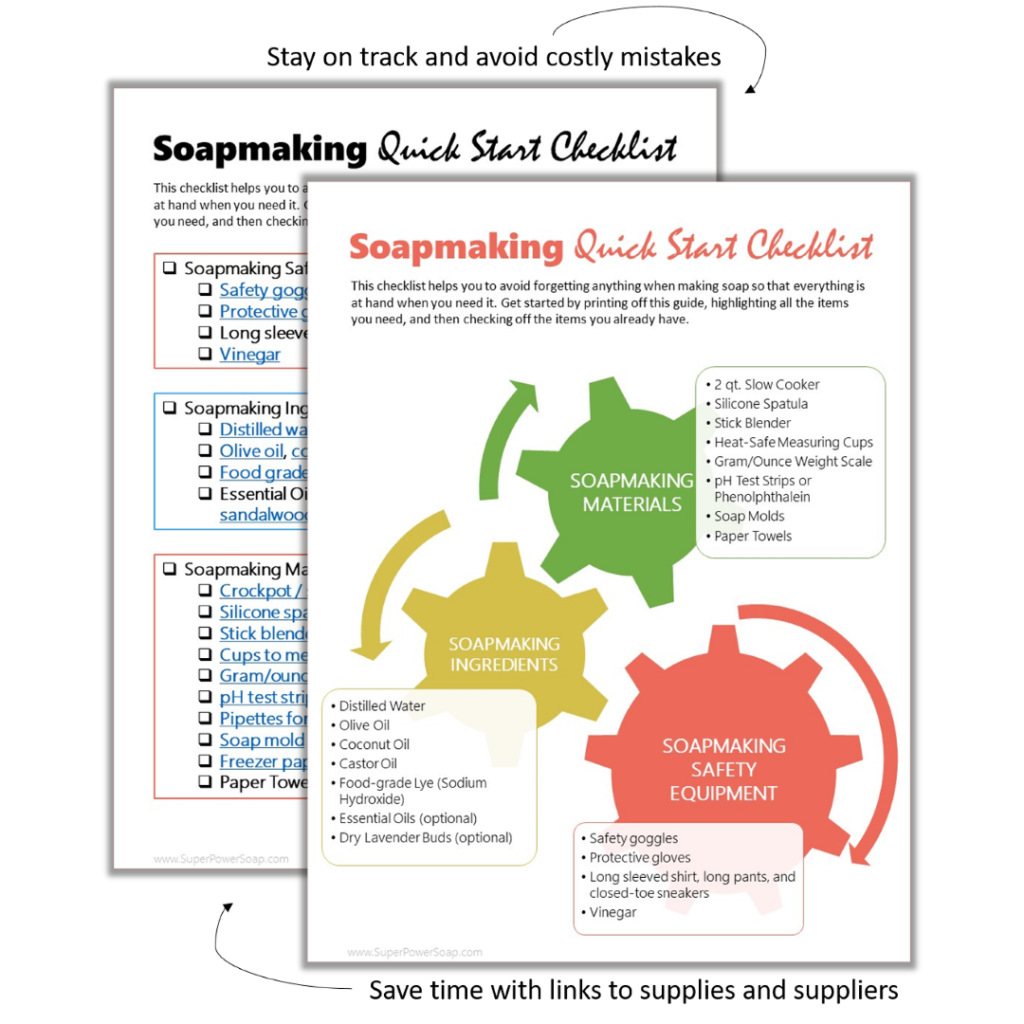Want to make soap? Maybe you want to make soap for your family, or sell soap as your side hustle. You’re in the right place. Soapmaking can seem like a daunting task to an absolute beginner. And while it is not easy, it’s also not difficult, and with this ultimate guide, you’ll be well on your way to successful soapmaking in no time. We’ll tell you what you need to know about soapmaking materials, suppliers, and ingredients.
Download my free ebook to get all of these resources in an easy to follow PDF guide.
Essential Beginner’s Soapmaking Books
- The Soapmaker’s Companion: A Comprehensive Guide with Recipes, Techniques & Know-How (Natural Body Series – The Natural Way to Enhance Your Life)
- The Soapmaker’s Companion by Susan Miller Cavitch is a comprehensive guide for beginners who want to make soap with natural ingredients. It offers recipes and techniques for crafting a variety of soaps.
- The Soapmaker’s Companion by Susan Miller Cavitch is a comprehensive guide for beginners who want to make soap with natural ingredients. It offers recipes and techniques for crafting a variety of soaps.
- The Everything Soapmaking Book
- The Everything Soapmaking Book by Alicia Grosso is another book that’s perfect for beginners. With detailed recipes, instructions, and photos, you’ll learn how to make handmade soap with ease.
Soapmaking Help!
- Soap Troubleshooting Guide
- Bramble Berry’s Soap Troubleshooting Guide is an excellent resource to use when researching problems with your soap. You’ll learn how to spot whether the oil/lye ratios are off, why your soap is too soft or too hard, and the causes of any weird spots on your bars. This comprehensive guide breaks down the reasons and solutions for all of the most common soapmaking problems.
- Bramble Berry’s Soap Troubleshooting Guide is an excellent resource to use when researching problems with your soap. You’ll learn how to spot whether the oil/lye ratios are off, why your soap is too soft or too hard, and the causes of any weird spots on your bars. This comprehensive guide breaks down the reasons and solutions for all of the most common soapmaking problems.
Soapmaking Safety Equipment
- Safety goggles
- We all know how important it is to prevent accidents. Safety goggles provide a shield for your eyes and face from harmful substances. Use sturdy safety goggles when mixing, pouring, or cleaning.
- We all know how important it is to prevent accidents. Safety goggles provide a shield for your eyes and face from harmful substances. Use sturdy safety goggles when mixing, pouring, or cleaning.
- Protective gloves
- When working with lye solutions, the most important thing you need is protection. Use chemical resistant gloves to protect your hands from lye burns.
- When working with lye solutions, the most important thing you need is protection. Use chemical resistant gloves to protect your hands from lye burns.
- Long sleeved shirt, long pants, and closed toe sneakers
- Protect your skin from accidental lye spills by wearing all of the above while soapmaking.
- Protect your skin from accidental lye spills by wearing all of the above while soapmaking.
- Vinegar
- Vinegar helps neutralize accidental lye spills on surfaces. Keep vinegar on hand when making handmade soap.
Soapmaking Ingredients
- Distilled water
- Distilled water is perfect for use in soapmaking. It contains no impurities that could affect the quality of your batch.
- Distilled water is perfect for use in soapmaking. It contains no impurities that could affect the quality of your batch.
- Oils and fats
- Ingredients like olive oil, coconut oil, and castor oil, shea butter, palm oil, are easy to find.
- Ingredients like olive oil, coconut oil, and castor oil, shea butter, palm oil, are easy to find.
- Food grade lye (sodium hydroxide)
- Lye is an essential ingredient in natural soapmaking. In the process of saponification, lye converts fats and oils into soap. The only lye you should use for soapmaking is 100% food grade lye which includes few impurities.
- Lye is an essential ingredient in natural soapmaking. In the process of saponification, lye converts fats and oils into soap. The only lye you should use for soapmaking is 100% food grade lye which includes few impurities.
- Essential oils (optional)
- Essential oils can be used to make soap that is both fragrant and beneficial for your skin. These fragrances are sourced from plants found in nature and vary greatly in availability and price. Common essential oils used in soapmaking include peppermint, lavender, rosemary, orange, and sandalwood.
- Essential oils can be used to make soap that is both fragrant and beneficial for your skin. These fragrances are sourced from plants found in nature and vary greatly in availability and price. Common essential oils used in soapmaking include peppermint, lavender, rosemary, orange, and sandalwood.
- Fragrances (optional)
- Fragrance oils offer a wide range of scents used in soapmaking. They are often used on their own or blended with essential oils to create unique scents. Common fragrance oils include strawberry, rose, green tea, mango, and musk.
- Fragrance oils offer a wide range of scents used in soapmaking. They are often used on their own or blended with essential oils to create unique scents. Common fragrance oils include strawberry, rose, green tea, mango, and musk.
- Clays and dry botanicals (optional)
- Colorants (optional)
- Soap colorants come in two forms: (1) plant-based pigments like rosehips and (2) laboratory-made colors. Either option creates beautiful, vibrant bars.
Online Soapmaking Ingredient Suppliers
- Bramble Berry
- Bramble Berry offers an extensive selection of high quality soapmaking supplies and kits. Whether you are a novice or an experienced soap maker, you will find all the ingredients, tools, and equipment you need to make your own natural soaps.
- Bramble Berry offers an extensive selection of high quality soapmaking supplies and kits. Whether you are a novice or an experienced soap maker, you will find all the ingredients, tools, and equipment you need to make your own natural soaps.
- Essential Depot
- Essential Depot offers a wide selection of soapmaking supplies, such as food grade lye, oils, and equipment.
- Essential Depot offers a wide selection of soapmaking supplies, such as food grade lye, oils, and equipment.
- Bulk Apothecary
- Bulk Apothecary is another leading supplier of quality ingredients for soapmakers. They provide essential oils, fragrance oils, soapmaking supplies and more.
Soapmaking Materials
Use materials that are dedicated for soapmaking to avoid cross contamination.
- Crockpot™ / slow cooker
- A slow cooker is the best tool for making hot process soap from scratch. You’ll benefit from temperature control and even heating.
- A slow cooker is the best tool for making hot process soap from scratch. You’ll benefit from temperature control and even heating.
- Silicone spatula (for mixing soap and mixing lye/water solution)
- Silicone spatulas are long lasting and resist wear and tear. Use these to mix oils and incorporate ingredients.
- Thick plastic pitcher for mixing lye and water mixture
- The best container to use for mixing lye is a sturdy plastic pitcher – preferably with a lid.
- Stick blender
- The stick blender is an excellent tool to use when making soap. It ensures that you can mix and stir to quickly incorporate the oil and lye water mixture. It is also the perfect tool to use when adding colors and scents to your soap because it will blend them in well.
- The stick blender is an excellent tool to use when making soap. It ensures that you can mix and stir to quickly incorporate the oil and lye water mixture. It is also the perfect tool to use when adding colors and scents to your soap because it will blend them in well.
- Cups to measure oil/fat, lye, water
- A dedicated set of measuring cups for making soap is great for keeping your space organized and contamination-free.
- A dedicated set of measuring cups for making soap is great for keeping your space organized and contamination-free.
- Gram/ounce weight scale
- To make soap, you need to measure the ingredients precisely and accurately. The process of soapmaking requires a scale to measure the weight of oils, butters, lye, fragrance, and more in ounces or grams. You can’t make a quality batch of soap without a good scale.
- pH test strips
- pH test strips are an important tool in soapmaking. pH test strips measure the acidity or alkalinity of soap at various phases to determine when it is safe for use on skin.
- Phenolphthalein
- A chemical used to test the pH of fresh soap samples.
- A chemical used to test the pH of fresh soap samples.
- Pipettes for measuring fragrances (optional)
- Pipettes are used by soapmakers to transfer fragrance oils and essential oils from one container to another.
- Soap mold
- This soap mold is used to create beautiful soaps for different occasions. Choose from 16 different shapes and colors for your next project or use it to make your own.
- This soap mold is used to create beautiful soaps for different occasions. Choose from 16 different shapes and colors for your next project or use it to make your own.
- Freezer paper
- With freezer paper, you can easily make your own soap molds at home. Simply trace the soap mold onto the paper, cut it out, line the container, and fill it with soap. The paper will prevent the wet soap from leaking out while the soap sets.
Government Resources for Soapmaking Businesses:
- FDA Small Business Factsheet
- The FDA regulates cosmetic soap and other daily use products. Learn everything you need to know about cosmetic soap and how to comply with regulations.
- The FDA regulates cosmetic soap and other daily use products. Learn everything you need to know about cosmetic soap and how to comply with regulations.
- CPSC Soap Business Guidance
- The Soap Business Guidance page is written by the Consumer Product Safety Commission. It’s designed to provide soapmakers with basic information about how cleansing soaps are regulated.
Download my free ebook to get all of these resources in an easy to follow PDF guide.

